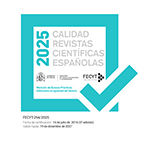Vision and Textuality in
Resumen
This article examines the conflict between visual and textual forms of representation as a central theme of Bildung in Goethe’s Wilhelm Meisters Lehrjahre. Wilhelm’s earliest interest in the theater is clearly motivated by a desire for the exclusive vision promised by this institution. However, though Wilhelm wants a share in the illusive power of vision, he finds himself utterly seduced by security of textual representation. Through most of the novel, Wilhelm seems unable to believe his own eyes unless the validity of his vision is corroborated by some textual «evidence.» Wilhelm’s relationship to representation changes when he learns of his potential fatherhood. For the first time he recognizes the deceptive potential of textual representation and truly desires to «see» Felix as his son. Therefore, Wilhelm ends his futile pursuit of vision through the theater and joins another théa-tron — the panoptic Tower Society. Though the Tower Society will endow Wilhelm with some measure of the power of vision he so keenly desires, it comes at a cost. In submitting to the absolute ocular power of this society of visionaries, Wilhelm sacrifices his autonomy. His Bildung ends with the image of his own Bild — rendered in minute detail by the masterful and manipulative hands of the Tower Society.Descargas
Descarga artículo
Licencia
La Revista de Filología Alemana, para fomentar el intercambio global del conocimiento, facilita el acceso sin restricciones a sus contenidos desde el momento de su publicación en la presente edición electrónica, y por eso es una revista de acceso abierto. Los originales publicados en esta revista son propiedad de la Universidad Complutense de Madrid y es obligatorio citar su procedencia en cualquier reproducción total o parcial. Todos los contenidos se distribuyen bajo una licencia de uso y distribución Creative Commons Reconocimiento 4.0 (CC BY 4.0). Esta circunstancia ha de hacerse constar expresamente de esta forma cuando sea necesario. Puede consultar la versión informativa y el texto legal de la licencia.










